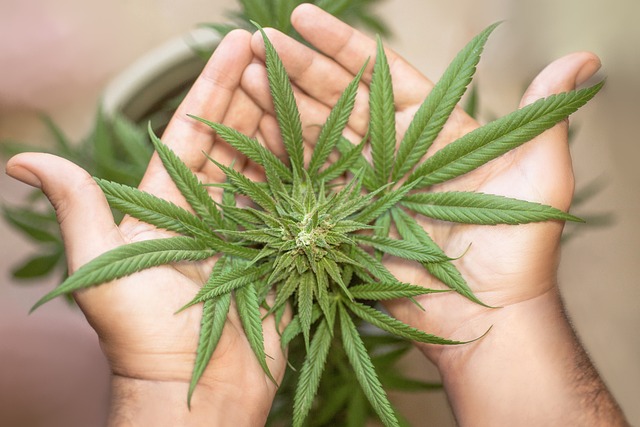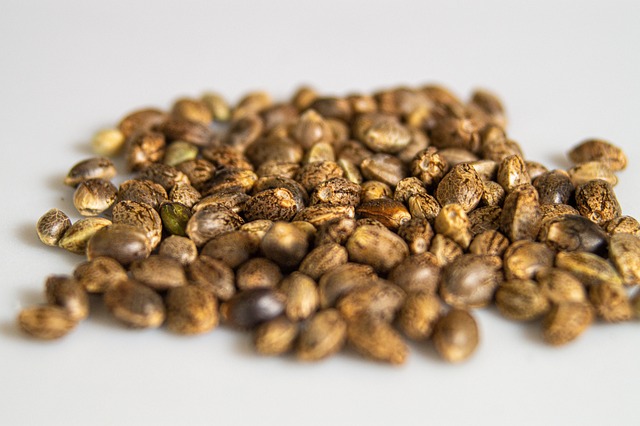2023 marked a significant shift in Arizona's wellness community with the rise in interest for THCA (Tetrahydrocannabinolic Acid), a non-psychoactive cannabinoid that has garnered attention due to its potential therapeutic benefits. The legalization of medical marijuana in Arizona, alongside legislative changes, created an environment conducive to the emergence and acceptance of THCA as a legal entity within certain parameters. THCA flower has emerged as a popular alternative to traditional THC or CBD products, valued for its lack of psychoactive effects and now readily available in various strains and derivatives across Arizona's market. The state's regulatory framework ensures responsible cultivation and sale, reflecting the growing acceptance of cannabinoids beyond just THC and CBD within the legal marketplace. THCA's non-psychoactive status under hemp regulations allows for its production and sale in compliance with laws like the 2018 Farm Bill, which permits products containing less than 0.3% Delta-9 THC on a dry weight basis. Arizona consumers can access a variety of THCA-rich hemp-derived products with claimed health benefits, provided they adhere to state regulations and purchase from licensed dispensaries. It's important for consumers to understand the legal distinctions between THCA and its psychoactive counterpart, Delta-9 THC, and to follow labeling guidelines to ensure safe and compliant usage of these products in Arizona.
Exploring the therapeutic potential and rise of THCA (Tetrahydrocannabinolic Acid) flower within Arizona’s burgeoning cannabis market, this article delves into the nuanced differences between THCA and its psychoactive counterpart, Delta-9 THC. As THCA becomes legally recognized in Arizona, understanding its unique effects, safe consumption practices, and compliance with state regulations is paramount for consumers. We examine the side effects associated with THCA flower, highlighting the importance of dosage and proper handling to maximize benefits while minimizing risks. From the entourage effect’s influence on user experiences to the latest efficacy studies, this comprehensive guide addresses every facet of THCA flower, ensuring users are well-informed about this non-intoxicating cannabinoid’s impact on health and well-being.
- THCA Flower and Its Emergence in the Arizona Market
- Understanding Delta-9 THC vs. THCA: What Sets Them Apart?
- Legal Landscape of THCA in Arizona: Compliance and Consumer Considerations
THCA Flower and Its Emergence in the Arizona Market

The non-psychoactive cannabinoid THCA (Tetrahydrocannabinolic Acid) has gained attention within the wellness community for its potential therapeutic properties. As of recent developments, THCA flower has made a notable emergence in Arizona’s market, following the state’s legislative changes that have gradually expanded the legal landscape for cannabis products. The legalization of medical marijuana in Arizona paved the way for broader cannabis-related reforms, leading to the inclusion of THCA as a legal entity under certain conditions. This has opened up new opportunities for consumers looking for alternatives to THC (Tetrahydrocannabinol) or seeking the benefits associated with cannabidiol (CBD). The THCA flower, often preferred for its potential effects without the psychoactive ‘high’ typically associated with THC, is being cultivated and sold in compliance with Arizona’s regulations. This has sparked interest among individuals seeking natural remedies and those curious about the broader spectrum of cannabinoids available within the state’s legal marketplace. As awareness and demand for THCA-rich products continue to rise, Arizona’s market is adapting, offering a variety of THCA flower strains and derivatives, contributing to the growing diversity of legal cannabinoid products available to consumers in the state.
Understanding Delta-9 THC vs. THCA: What Sets Them Apart?

Delta-9 tetrahydrocannabinol (Delta-9 THC) and tetrahydrocannabinolic acid A (THCA) are both prominent compounds found in the cannabis plant, each with distinct effects and legal statuses. THCA is the non-psychoactive precursor to Delta-9 THC, which becomes psychoactive after heating through processes like smoking or vaporizing. In its raw form, THCA is present in hemp and many cannabis strains and is considered legal in Arizona under the 2018 Farm Bill, as long as it contains less than 0.3% Delta-9 THC on a dry weight basis. The legal distinctions are crucial for consumers and producers alike, as THCA products can be marketed and sold legally in states with hemp-friendly regulations, unlike their psychoactive counterpart which remains subject to more restrictive laws outside of recreational or medical marijuana programs.
The effects of THCA differ significantly from those of Delta-9 THC. THCA is being studied for its potential therapeutic properties, including anti-inflammatory and neuroprotective benefits, without the psychoactive ‘high’ associated with Delta-9 THC. This has led to a surge in interest for THCA in wellness and health products, particularly where legal. In Arizona, where THCA is legal, consumers have access to a broader range of hemp-derived products that can be marketed based on these potential health benefits. Understanding the differences between THCA and Delta-9 THC is essential for anyone interested in exploring cannabis products, as it allows for a more informed decision regarding the desired effects and legal compliance of their choices.
Legal Landscape of THCA in Arizona: Compliance and Consumer Considerations

In Arizona, the legal status of THCA flower is a subject of ongoing discourse and regulation within the evolving cannabis market. As of the knowledge cutoff in 2023, THCa, or tetrahydrocannabinolic acid, which is the precursor to THC, the psychoactive component of cannabis, is legal under Arizona’s medical marijuana program. Patients with a valid recommendation from a qualified healthcare provider can access products containing THCa. However, consumers must adhere strictly to state regulations regarding possession and purchase to remain compliant. Dispensaries authorized to sell medical marijuana may offer THCa flower, but it is imperative for consumers to ensure they are purchasing from licensed establishments to avoid legal repercussions. The Arizona Department of Health Services oversees the program, setting forth guidelines and ensuring that only qualifying patients can access these products. Consumers interested in THCa should be well-versed in labeling requirements, as products must clearly state their cannabinoid content, potential effects, and any relevant warnings to ensure safe use within the legal landscape established by the state. Understanding Arizona’s compliance measures is crucial for both patients and recreational users to navigate the market responsibly and legally.
In recent times, the THCA flower has gained prominence in the Arizona market, offering a distinct alternative to traditional Delta-9 THC products. This article has delved into the unique properties of THCA, its emerging presence as a legal entity in Arizona, and the regulatory framework governing its use. Understanding the nuanced differences between THCA and Delta-9 THC is crucial for consumers looking to engage with cannabinoid products responsibly within the state’s compliance guidelines. As THCA continues to carve out its niche in Arizona, it’s clear that the legal landscape surrounding this cannabinoid will evolve, warranting ongoing attention and consideration from both lawmakers and users alike.
